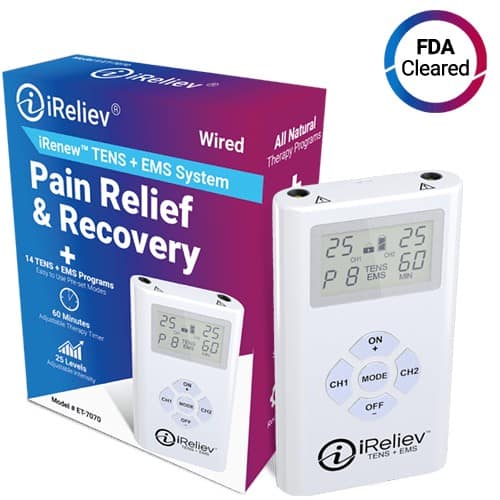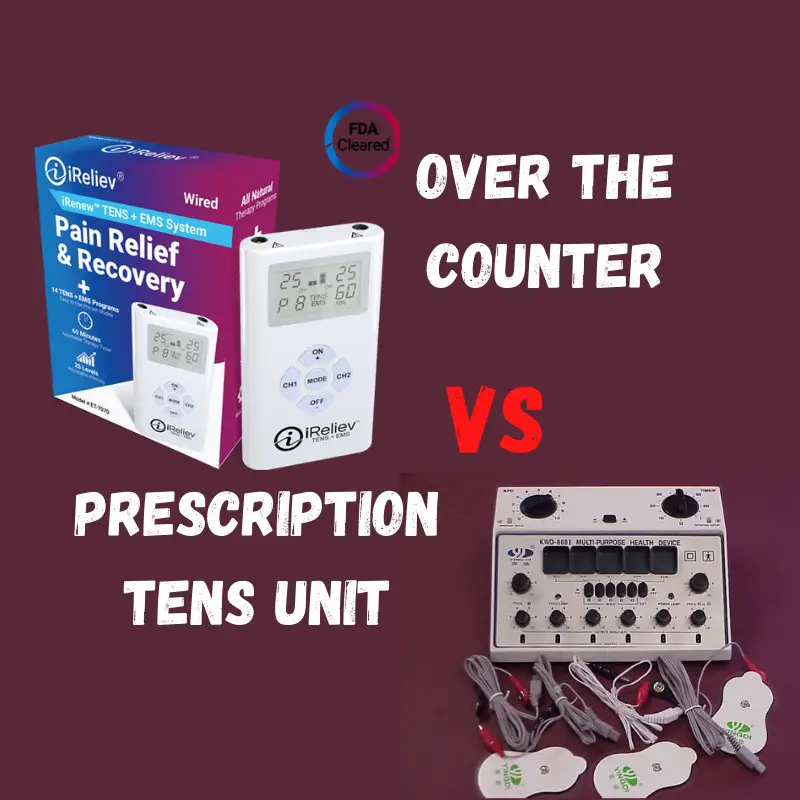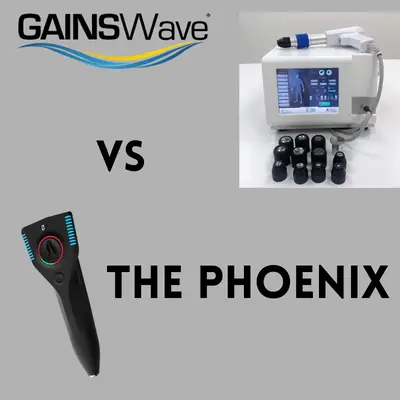A transcutaneous electrical nerve stimulation (TENS) unit is used to relieve pain by interrupting pain messages in your nerves. It does this with mild electrical currents that hinder pain signals from being sent to the brain, and by stimulating natural pain relievers, known as endorphins. For those looking to manage their pain without medication, TENS units are available both by prescription and over-the-counter.
Over-the-counter TENS units used to not be as powerful and effective as those available by prescription. For those with chronic pain, this made a big difference. But the newer OTC units offer a much higher milliamp (mA) output, reaching the same levels as prescription machines at a much lower price.
In this article, we will take a look at the main differences between the two types of machines, including the differences in availability, cost, and function.
Over-the-Counter TENS Units
Over-the-counter (OTC) TENS units are often portable, easy to use, and FDA approved at-home pain relief machines. Where older OTC TENS units had relatively low mA outputs, they now reach the same levels as the prescription units. For a TENS unit to be effective, you should check that the mA output is over 80.
Where they were once seen as lesser products that weren’t as effective, they are now thought to be excellent options for non-invasive pain relief.
Pros
- Over-the-counter TENS units are available for purchase at most well-known stores. A simple Amazon search offers over 700 results of at-home units that can be delivered straight to your door. A similar search on Walmart provided over 1000 results, allowing you to compare models on their website before making a choice.
- Many products can be checked out and compared online before purchase. Looking through any online retailer, you can see hundreds of reviews from users to help when deciding. Hearing feedback from real users should help to narrow down your search.
- These units are often easier to use. Though you should always consult your doctor before use, OTC units come with detailed instructions and preset functions that are designed to target the most common areas of chronic pain. Being designed for at-home use, they are made to be simple and easy to navigate.
- The prices are very reasonable. Some of the prescription units can cost well over $100. Although you can find OTC units for a similar price, many are under $60 and offer a number of functions and an adequate mA output. The smaller price tag makes these a far more accessible option for lower-income people suffering from chronic pain.
Cons
- It can be difficult to compare models accurately. Because there are so many to choose from, you may feel overwhelmed when researching. A manufacturer will often provide so much information, and the important aspects can get lost in the text.
- Some devices have not been FDA approved. When looking for an OTC unit, it is vital to make sure that the unit has been FDA approved for use at home. It should say in the product description, and you can check by searching on the FDA’s website for the specific product.
- Many over-the-counter units have limited functions. Where prescription units can offer the same number of options available to a physician, OTC units are often limited to fewer modes and presets. This means it isn’t possible to tailor the machine to your specific needs.
- Some find that even newer products are not powerful enough. You can find OTC units with a high mA output, but you may have to really look for it. Often, the amplitude is not given in the description, as can be seen here, in this list comparing TENS units. When looking, you want to try to find an mA output of close to 100 in order to be as effective as a prescription unit.
Looking for an OTC TENS Unit?

Prescription TENS Units
When looking for pain relief, it is always safer to consult with your doctor before making any decisions. Since TENS units are not recommended for use if you have a pacemaker, might be pregnant, or have epilepsy, you should always seek advice first. Your doctor can advise you toward a specific product and even show you how to use it properly.
Pros
- Prescription TENS are only available with written consent from your doctor. This means the device you will be using is recommended by a doctor to treat your pain. These are often the same unit used by doctors and nurses and are more likely to be effective.
- These units offer far more choices in terms of settings and modes. With anywhere from 10 to 100 different levels and modes, a user should have no problem finding the setting that works best for their specific needs.
- Prescription units can be covered by insurance. Unlike the over-the-counter units, some insurance programs now offer to pay for the doctor recommended units if you can provide them with a copy of the prescription or a letter of medical necessity.
- You can try the machine under doctor supervision before making the purchase for at-home use. Your doctor can offer you treatments in the office or rent you a machine in order to see if a TENS unit is right for you. It can take a few sessions to know for sure, but TENS units may not be effective for everybody, and in testing with your doctor first, you can be sure before you buy.
Cons
- You might have to wait for the prescription. Your doctor may want to spend time working with you to find which machine, if any at all, is right for you. If you are in chronic pain, you might not be able to wait.
- Insurance often requires proof of pain before covering the unit. You may find that your insurance provider will need proof that you have been in pain for at least three months and that you have explored other options before looking at a TENS unit.
- You may find they are complicated to use. Though having lots of options can be a good thing, for some, it may be too much, and fully understanding each different setting might take some time.
- They can cost anywhere from hundreds to thousands of dollars. Since these units are medical-grade, you will pay more for that service, and many insurance providers won’t be willing to cover the cost.
Which Unit Should You Choose?
If you have chronic pain, such as arthritis, TENS units can be very effective, and if that pain is not too acute, an over-the-counter TENS unit should be enough to help relieve your pain. They are portable, easy to use, and now provide the same level of mA output as the prescription units.
For those looking for a new way to treat their pain, there are plenty of OTC units with lots of reviews to help you decide. The smaller price tag makes them more accessible and worth a try. On the other hand, if you are looking for a long-term option for serious chronic pain, you would be better suited to visiting your doctor and getting a prescription. These units offer more settings so you can adjust the unit’s output to fit you exactly – rather than relying on preset functions in the OTC units. They also have the option to rent you the machine, so you aren’t making such a big investment.
Conclusion
TENS units are not designed to cure pain, but rather help in managing it. For some, this non-invasive option is preferable to powerful pain medications. When looking for a TENS unit, it is important to consider the mA output and number of modes available, and you should always consult with your doctor before trying anything new.
Sources
- Medical News Today: TENS unit: Benefits, side effects, and research
- CorrosionPedia: What is a Milliamp
- TENS Units: Buy TENS Units for Pain Relief
- iReliev: What You Need to Know About the Over-the-Counter TENS Unit
- FDA: Medical Devices
- TENSproducts: Prescription TENS Units
- HugSkott.com: Top 18 recommendation tens machine for 2017
- Wage Works: What is a Letter of Medical Necessity?
- Electro Medtech: How Much Does a TENS Unit Cost?
- HealthGrades: 5 Tips for purchasing TENS unit
- Electrotherapy: Transcutaneous Electrical Nerve Stimulation (TENS)





2 responses to “Over the Counter vs a Prescription TENS Unit”
[…] will depend on your insurance company. Since a TENS unit does not require a prescription from a doctor your insurance may not cover the item. To be on the safe side you should call your […]
[…] using a TENS unit reduces pain and more importantly decreases the need for over the counter pain medications. They are affordable and easily purchased online or at a pharmacy with no […]